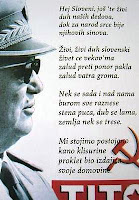The National Anthem of Egypt
 Starting in 1869, Egypt had a royal anthem to honour the monarch. Popular belief was that it was Verdi who wrote the anthem, however, this may not be so, all that is known for sure was that the composer was Italian. Despite being composed by an Italian, the anthem is very typical of others used in the area at the time, a classic example of the "Arab fanfare" style of anthem.
Starting in 1869, Egypt had a royal anthem to honour the monarch. Popular belief was that it was Verdi who wrote the anthem, however, this may not be so, all that is known for sure was that the composer was Italian. Despite being composed by an Italian, the anthem is very typical of others used in the area at the time, a classic example of the "Arab fanfare" style of anthem.It is unclear how long this anthem was in use until, however. The monarchy was deposed in 1952, however, this anthem was used as part of the anthem of the United Arab Republic with Syria in 1958.
"Walla Zaman Ya Selahy" was first written for Um Kulthoum, the "Diva of Arabic Song", and achieved great national popularity in 1956, finally being adopted as the national anthem in 1960. The chorus only was sung, followed by an instrumental interlude, then a repeat of the chorus. The anthem was also used, without words, from 1965-1981 by Iraq, who was seeking a greater Arab state that would link those two nations with other Arab states.
After the 1979 signing of the peace accord with Israel, Egypt adopted a new, more peace-oriented national anthem, "Bilady, Bilady, Bilady" (My Homeland, My Homeland, My Homeland), presently the anthem in use .The music was composed by Sayed Darwish, a pioneer of Arabic music and a leader of the modern Egyptian renaissance at the turn of the 20th century. He also maintained close ties with early leaders of the national movement for independence in the Middle East, such as Mustapha Kamel. In fact, the words of Egypt's national anthem by Younis-al Qadi, were derived from one of Kamel's most famous speeches.
Sayed Darwish (March 17, 1892 – September 15, 1923) was an Egyptian singer and com poser who was considered the father of Egyptian popular music. He was born in Alexandria on March 17, 1892. He put music to the Egyptian national anthem, Bilady, Bilady, Bilady, the words of which were adapted from a famous speech by Mustafa Kamil. Darwish died of a heart attack from a cocaine overdose in Alexandria on September 15, 1923 at age 31. Coincidentally, on the day of his death, the national Egyptian leader Saad Zaghloul returned from exile; the Egyptians sang Darwish's new song "Bilady, Bilady, Bilady" which was to become the national anthem in 1979.
poser who was considered the father of Egyptian popular music. He was born in Alexandria on March 17, 1892. He put music to the Egyptian national anthem, Bilady, Bilady, Bilady, the words of which were adapted from a famous speech by Mustafa Kamil. Darwish died of a heart attack from a cocaine overdose in Alexandria on September 15, 1923 at age 31. Coincidentally, on the day of his death, the national Egyptian leader Saad Zaghloul returned from exile; the Egyptians sang Darwish's new song "Bilady, Bilady, Bilady" which was to become the national anthem in 1979.
 poser who was considered the father of Egyptian popular music. He was born in Alexandria on March 17, 1892. He put music to the Egyptian national anthem, Bilady, Bilady, Bilady, the words of which were adapted from a famous speech by Mustafa Kamil. Darwish died of a heart attack from a cocaine overdose in Alexandria on September 15, 1923 at age 31. Coincidentally, on the day of his death, the national Egyptian leader Saad Zaghloul returned from exile; the Egyptians sang Darwish's new song "Bilady, Bilady, Bilady" which was to become the national anthem in 1979.
poser who was considered the father of Egyptian popular music. He was born in Alexandria on March 17, 1892. He put music to the Egyptian national anthem, Bilady, Bilady, Bilady, the words of which were adapted from a famous speech by Mustafa Kamil. Darwish died of a heart attack from a cocaine overdose in Alexandria on September 15, 1923 at age 31. Coincidentally, on the day of his death, the national Egyptian leader Saad Zaghloul returned from exile; the Egyptians sang Darwish's new song "Bilady, Bilady, Bilady" which was to become the national anthem in 1979.Egyptians consider Sayed Darwish to be among their greatest musicians and their single greatest composer. In addition to the songs mentioned above, he composed "Shed el hezam" ("Pull the Belt"), "Malo'ouna," "Ana Haweit," "Oum Ya Masry" (Rise You Egyptian), and "Salma Ya Salama."
The stamps features the composer Sayed Darwish with scores/staves of the national anthem issued in 1992.






